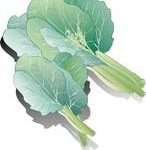There is  a wide range of calcium intakes among vegans (just as among omnivores) and the evidence shows that some vegan diets fall short of recommendations. As far as we know, vegans need as much calcium as anyone else. And, with just a little bit of knowledge and some attention to food choices, it’s not at all difficult to get enough. My latest vegan nutrition primer provides simple guidelines for getting calcium from plant foods.
a wide range of calcium intakes among vegans (just as among omnivores) and the evidence shows that some vegan diets fall short of recommendations. As far as we know, vegans need as much calcium as anyone else. And, with just a little bit of knowledge and some attention to food choices, it’s not at all difficult to get enough. My latest vegan nutrition primer provides simple guidelines for getting calcium from plant foods.
Please share it with anyone you know who is concerned about calcium in vegan diets.

For the greens, is that two cups pre or post cooking? I’m assuming 2 cups post cooking, but wanted to check.
It’s two cups of cooked greens–or 4 cups of raw.
Thanks for the very helpful article.
Should we be concerned about the effect of drinking tea or coffee with/around meals on calcium absorption? I’ve heard that tea in particular can block the absorption of calcium.
Yes, it can block absorption of calcium and also of iron. So if you drink a lot of tea, it’s good to have it apart from meals. But an occasional cup of tea with a meal is okay.
Thank you, your primers are great! (I am currently translating them into German to print out for my mother, who recently went almost vegan. (: )
I have a question about fortified milks: In Germany, all but one brand of available plant milks are organic, which is probably why they add 120mg/ml calcium from Lithothamnium Calcareum (extract?), instead of the usual compounds. Do you know its bioavailability?
That’s an algae extract, and I don’t know about its bioavailability. Animal studies show it to be a good source, but I don’t know if it’s been tested in humans. I wonder why German companies won’t use more usual types of added calcium?
Thanks for the reply, Ginny!
Apparently, to get the EU organic label (which is the minimum requirement to call something “organic”), you mustn’t add isolated vitamins or minerals to the product, unless required by law (like for baby foods, thankfully). However, you are allowed to add nutrient-rich extracts, like Lithothamnium.
And since marketers see soymilk in the “organic/health-food/anti-GMO/environmentalist/…” niche (which is quite big in Germany), all plant milks on the market, including the more affordable ~1,20€ supermarket-brand ones, are EU-organic, and thus without added vitamins, but at least sometimes with calcium from algae. Alpro is the only exception, making non-organic milks (with added calcium, B12 and D). But being *the* soymilk brand, they are more expensive at ~1,90€.
This might be lamenting in luxury, with the organic discounter-brand soymilks and all… 😀 But still, it would be so easy to improve the situation further.
Great primer!
If you eat a high oxalate food with a low oxalate food (e.g. spinach and kale in the same salad), will the oxalate in the high oxalate food inhibit calcium absorption from the low oxalate food? In other words, is it preferable not to combine them to optimize calcium absorption?
Thank you for all the helpful and balanced information you share on this site!
Thanks, Angela!
And no–the oxalate in the spinach is mostly bound to the calcium in the spinach, so there isn’t much available to affect other foods in a meal.
Thanks, great primer!
If you (pressure) cook the spinach, won’t this lower oxalate levels and make the calcium absorbable?
Cooking spinach very well will reduce some of the oxalate, but I still wouldn’t depend on it for calcium. It’s a good source of potassium, though, so great to include in your diet. Just make sure you’re eating other foods that are good sources of well-absorbed calcium.
Have you seen this recent study on calcium?
http://well.blogs.nytimes.com/2015/10/05/study-reviews-find-calcium-doesnt-improve-bone-density/?_r=0
Hi Ginny, many thanks for this, very helpful. A couple of questions: does regular and red cabbage have enough calcium to qualify toward the two cups? How long do you recommend waiting after eating to have a cup of coffee and/or how long should I wait to eat after having a cup of coffee if I want to make sure to maximize absorption?
Thank you so much for all that you do!
Hi Ginny,
I am also a bit concerned about coffee and calcium intake. I do tend to have coffee and calcium rich foods in the same hour… is this ok? I normally have no more than 2 cups daily.
Thank you for this article!
Vitamin K can improve bone health by increasing calcium absorption and reducing urinary excretion of calcium.
Thank you for an interesting article.
I tend to make my own plant milks, usually soya, almond or hazelnut. Is it possible to fortify them myself?
And if so…..what with and how much?
[…] If science is your thing and you want some more information, check Ginny Messina’s site. […]
Hi Ginny,
Haven’t talked to you in ages!
Just a quick question…
Can you recommend a good vegan calcium supplement?
Thanks so much. May all be well with you & yours!
xox